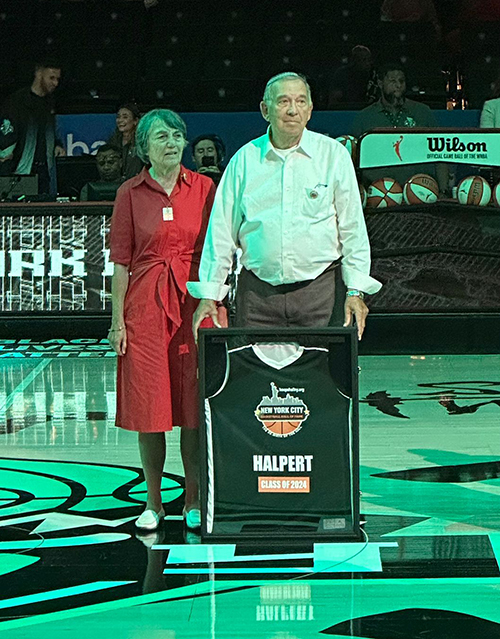A maiseh (story) is recounted as part of the Brisker tradition:
Rebbetzin Chana, the wife of Rav Eliyahu, the Gaon of Vilna would go door-to-door collecting tzedaka with her close friend. Together, the two righteous women were so close that they made a pact, vowing to one another that whoever passed from the world first would come back in a dream and share a vision of olam haba, and of what goes on in the next world.
After some time, Rebbetzin Chana’s friend was nifteres, and appeared to the wife of the Gr”a in a dream, saying, “The Heavenly court has forbidden me to fully reveal what happens here. But since we made an unbreakable vow during my life, I have returned to the world to tell you one thing: your merit in olam haba far exceeds mine…
“You see, long ago, on one of our fundraising missions we were expecting to meet a potential donor who ended up not being home. Later that day, we saw the baalas ha-bayis (hostess) up ahead in the distance about to cross the street. When we spotted her, you lifted your finger and motioned to catch her attention; she noticed your raised hand, and waited for us.
“Throughout all the years, we walked the same roads, expended the same efforts in zikui ha-rabim (public benefit) and we shared the same merit for the tzedaka we raised together… There was, however, an additional merit that you earned. And now, I can see the exalted portion in paradise reserved in honor of that act: the extra effort you expended by waving your hand! You can’t begin to imagine the infinite value of that one movement. Just lifting your finger and motioning in that woman’s direction has made an eternal impact in Heaven, and this will be your reward.”
~
Our sedra recounts our journey toward Eretz Yisrael, as we established treaties with those who sought peace, and handily crushed those who engaged us in battle. As Klal Yisrael marched north toward the Bashan, it says:
וַיֵּצֵא עוֹג מֶלֶךְ־הַבָּשָׁן לִקְרָאתָם הוּא וְכָל־עַמּוֹ לַמִּלְחָמָה אֶדְרֶעִי:
וַיֹּאמֶר ה׳ אֶל משֶׁה אַל תִּירָא אֹתוֹ כִּי בְיָדְךָ נָתַתִּי אֹתוֹ וְאֶת כָּל עַמּוֹ וְאֶת אַרְצוֹ וְעָשִׂיתָ לּוֹ כַּאֲשֶׁר עָשִׂיתָ לְסִיחֹן מֶלֶךְ הָאֱמֹרִי…
“…Og, the king of Bashan, came out toward them with all his people, to wage war at Edrei. Hashem said to Moshe, ‘Do not fear him, for I have delivered him, his people, and his land into your hand. You shall do to him as you did to Sichon, king of the Emori…’” (21:33-4)
On the surface, this seems hard to understand. Why would we need Hashem’s reassurance, “Do not fear…?” We had already witnessed many miracles at the Exodus, and many military victories thereafter. We had also learned a bitter lesson, with the incident of the meraglim, regarding what happens when we lack confidence and faith in Hashem and ourselves. What could Moshe Rabbeinu possibly be afraid of?
Rashi provides some background and context. In Parshas Lech Lecha, the shepherds of Lot and Avraham Avinu went separate ways. Lot settled in Sodom, among unsavory characters. Amid the “world war” between the four kings and five kings, Lot was taken captive. Then, ויבא הפליט, “A refugee came” (Bereishis, 14) from the battlefield to inform Avraham that his nephew had been taken into captivity and was in danger. This פליט was none other than Og who had escaped from the Rephaim. In response, Avraham gathered 318 men and embarked on a dangerous mission to rescue his misguided relative.
Og the giant was one of the more enigmatic figures in Tanach. His first appearance was as one of the Nephilim holding onto the side of Teivas Noach, and there are many other midrashim and Maamarei Chazal about his identity and journey. Notably, it is told that in the merit of assisting the family of Avraham, Og was rewarded with longevity. Commenting on our sedra, Rashi suggests that Moshe was afraid to face Og lest the “merit of Avraham” advocate for him and give him the power to harm Moshe.
On the other hand, Midrash Rabbah (Bereishis, 42:8) reveals that Og’s intent in informing Avraham about Lot’s situation was far from l’sheim Shamayim (for the sake of Heaven). Og had actually hatched a contrived, malicious plan. He knew Avraham’s dedication and loyalty to Lot. By gaining Avraham’s favor, Og wanted to gain access to his household, murder him and kidnap Sarah Imeinu. Certainly, then, he did not have any merit or powers from helping Avraham. So, why was Moshe afraid?
Rebbe Moshe Yechiel Epstein, the Be’er Moshe of Ozerov, enlightens us with a chiddush (new approach). Even though it had evil intent, there was a kernel of good within Og’s deed. Since good came from it and Lot was saved, Moshe Rabbeinu feared the zechus that Og had generated generations earlier. And this teaches us the power of one good deed, regardless of its intentions. Any good deed—no matter how tiny or tainted—is true; It has lasting power and causes a vast, eternal impact in Heaven.
~
Dr. Edward Lorenz, professor of meteorology at MIT, innovated a theory of “deterministic chaos” best known as “the butterfly effect.” He posited that even a miniscule disturbance like the delicate flapping of a butterfly’s wings can induce enormous consequences. This theory was enshrined in the title of one of his talks: “Predictability: Does the Flap of a Butterfly’s Wings in Brazil Set Off a Tornado in Texas?”
This theory is a challenge to our sense of predictability; such causes and effects cannot be observed in olam hazeh. And yet, our tzaddikim who have spoken from the standpoint of olam haba have revealed a Theory of Holy Chaos, a supernal “butterfly theory,” a chok (a law) beyond logic: every action, every choice is vastly significant. We cannot imagine its effect on the cosmic order, on history, on others, nor on our portion in the world to come. Every small, delicate detail of every mitzvah we do, even just lifting a finger l’sheim Shamayim, creates a tornado of blessing in Heaven.
תדע, שאיש כזה שהוא מגשם כל־כך, כל תנועה ותנועה שהוא מנתק עצמו מעט מעט מן גשמיותו ופונה להשם יתברך היא גדולה ויקרה מאד מאד, ואפלו נקדה קטנה מאד, שהוא נעתק מגשמיותו אליו יתברך, הוא רץ בזה כמה וכמה אלפים פרסאות בעולמות עליונים
Know that each and every movement which such a materialistic person makes to detach himself just a tiny bit from his materialism and turn to Hashem is extremely great and precious! Even if the shift from his materialism toward the Blessed One is miniscule (in this world), in the upper worlds he runs many thousands of miles with it…” (Likutei Moharan II, 48)
Rav Judah Mischel is executive director of Camp HASC, the Hebrew Academy for Special Children. He is the mashpiah of OU-NCSY, founder of Tzama Nafshi and the author of “Baderech: Along the Path of Teshuva.” Rav Judah lives in Ramat Beit Shemesh with his wife, Ora, and their family.













